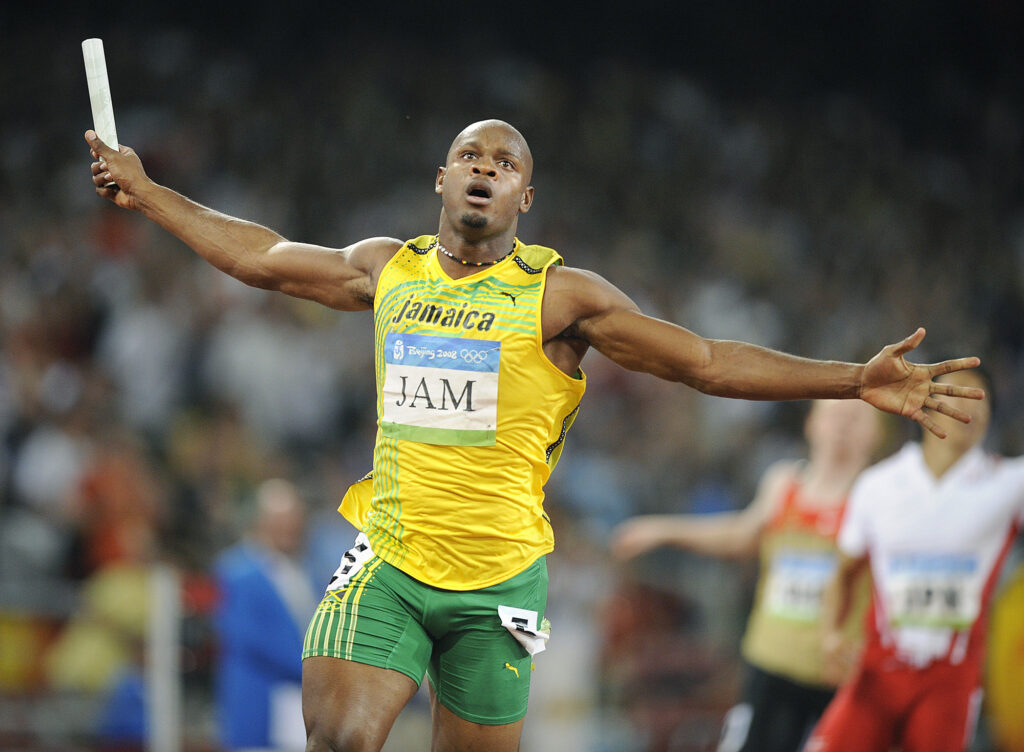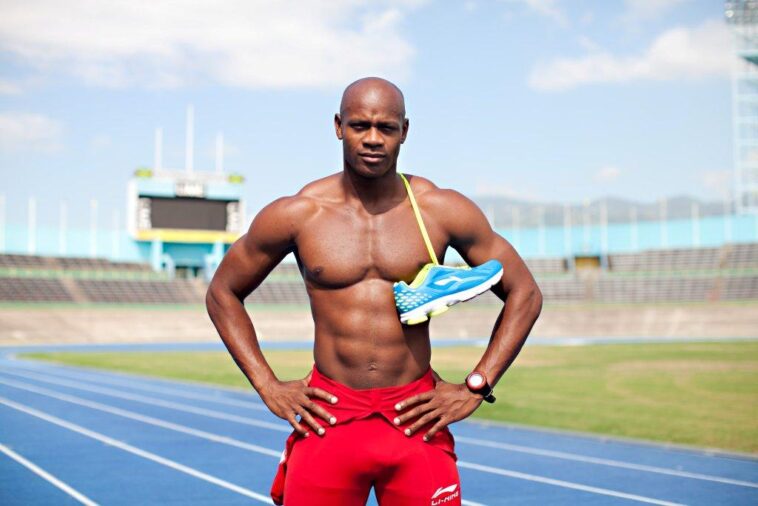Recently, a video featuring Jamaican sprint legend Asafa Powell went viral, stirring passionate debates across social media, television, and public forums. Known as the “Sub-10 King” for his record-breaking consistency in sprinting under ten seconds, Asafa made several striking statements that have reignited discussions about how Jamaica treats its athletes.
In the video, Asafa candidly revealed that he had received a lucrative offer during his prime to compete for another country. Reflecting on his career, he admitted that if he knew then what he knows now, he would have seriously considered accepting the deal. He further disclosed that despite years of sacrificing his body and dedicating his life to excellence on the track, he ran for Jamaica for free. He received little support compared to what could have been available elsewhere.
These revelations were sparked by a seemingly simple moment. His young son, Azhaf Powell, recently won his sports day race for St Peter and Paul, leading many fans and commentators to wonder if Asafa would want his children to represent Jamaica at an elite level. Asafa responded firmly, explaining that his children have options due to their mother, Alyshia Miller-Powell’s Ghanaian and Canadian heritage. He emphasized that unless Jamaica implements serious systematic reforms, he would not encourage his children to compete under the Jamaican flag.
His words were not said lightly. They carried the weight of years of personal experiences, sacrifices, and disappointments. The 42-year-old‘s criticisms point to a deeper, more troubling reality—one where Jamaica continues to reap the rewards of athletic brilliance without adequately investing in or caring for the athletes who deliver them.
Jamaica’s Response: The Messenger vs. the Message
The reactions to Asafa’s comments were swift, emotional, and divisive. Many Jamaicans, particularly in the media, chose to twist and sensationalise his statements, painting him as bitter, ungrateful, and resentful of his career trajectory. Critics argued that he was “ranting” and that his comments stemmed from a personal sense of failure for not achieving more gold medals at major championships.
However, others understood and agreed with his points. Influential voices like Cydon Bowen, Jermaine Brown, and Wayne Chen publicly supported Asafa’s stance. Additionally, platforms like All Angles provided thoughtful commentary, dissecting the validity of his arguments and giving space for a broader conversation about athlete welfare in Jamaica.
An important aspect is that many who rejected Asafa’s points focused more on who was speaking rather than what was being said. There’s an undeniable bias: if Usain Bolt, Shelly-Ann Fraser-Pryce, or Veronica Campbell-Brown had voiced the same concerns, the nation would have been far more receptive. This disparity reveals an uncomfortable truth—Jamaica often only truly celebrates and listens to its golden athletes while dismissing those who were “merely” great.
Was Asafa Powell Right? Absolutely.

Asafa Powell was 100% right in his critique. His words highlight structural and systematic issues plaguing Jamaican athletics for decades. Athletes who bring immense pride and glory to the nation are too often left without support once the cameras stop flashing and the cheers die down.
There is an unspoken expectation in Jamaica that athletes must sacrifice everything for national pride, without expecting tangible rewards or assistance in return. Yet passion alone does not pay bills, cover medical expenses, or secure a future for themselves or their families.
It’s easy to praise athletes when they are winning. However, it is equally important to establish a sustainable support system that ensures they thrive during and after their careers. Asafa’s delivery wasn’t polished. But the rawness of his comments only underscores the urgency of the matter. The truth often stings, but that does not make it any less valid.
What Needs to Be Done: A Roadmap for Reform
If Jamaica wants to retain its status as a global powerhouse in track and field, serious investment and changes must be made. Here are some comprehensive solutions:
1. Structured Transition Support
There must be organized programs to help young athletes transition from junior to professional levels. These should include mentorship, financial management training, and lifestyle adjustment assistance.
2. Financial Assistance and Subsidies
Athletes should receive grants or stipends to cover basic living expenses, allowing them to focus on training without the constant stress of financial insecurity.
Tax exemptions on training equipment
Government subsidies for travel and competition expenses.
3. World-Class Facilities
The country must invest in state-of-the-art training facilities across the island, making world-class gyms, tracks, and recovery centres accessible to all national athletes.
4. Healthcare and Mental Health Services
Access to free or subsidized healthcare, especially physiotherapy, is crucial.
Equally important is the availability of mental health services, such as psychologists specializing in performance anxiety, injury recovery, and post-career transition.
5. Housing Initiatives
Create an Athlete Housing Scheme where athletes who qualify (e.g., Olympic finalists) can live rent-free during their competitive years. Post-retirement, they should be supported through discounted housing programs via partnerships with institutions like NHT.
6. Financial Literacy and Career Planning
Offer mandatory courses in financial literacy, investment, and career planning. Scholarships for higher education and programs that teach valuable vocational skills empower athletes to transition smoothly into life after sport.
7. Nutrition Support
Partner with local farmers to provide athletes with monthly free produce packages, helping them maintain a proper diet essential for peak performance.
8. Utilities Relief
Every athlete who wins an Olympic or World Championship medal should receive exemptions from paying water and electricity bills for a set number of years.
9. Pension Plans
Implement a national pension fund specifically for athletes, ensuring they have a financial safety net once they retire.
Jamaica Can’t Take Its Athletes for Granted Any More
Jamaica prides itself on punching above its weight in global athletics. Despite limited resources compared to wealthier nations, our athletes consistently dominate world stages. However, this dominance cannot and will not continue if we fail to invest meaningfully in the people who make it possible.
The harsh reality is that today’s young athletes are more aware, more globalized, and less willing to suffer in silence. They will go where they are valued, respected, and supported. If Jamaica does not shape up soon, we will face a future where our best talents choose to represent other nations. Such switches aren’t rooted in disloyalty, but out of sheer necessity.
Medals are wonderful, but they cannot pay school fees, electricity bills, hospital charges, or put food on the table, as Asafa Powell alluded to. Only with a structured, supportive system can we ensure that our athletes bring us glory. But, more importantly, they enjoy the dignity, respect, and prosperity they deserve.
It’s time for Jamaica to do better—before it’s too late.






GIPHY App Key not set. Please check settings